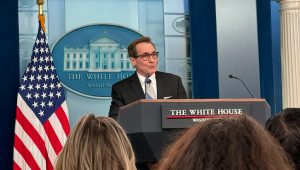The White House confirmed on Tuesday reports of Russia's development of an anti-satellite weapon capability, describing it as a serious concern but insisting that the weapon is not yet operational and does not pose an immediate danger.
“The administration did not give a green light for this information to get public yesterday,” said President's national security communications adviser John Kirby at a White House news conference. “We were eventually going to get to a point where we were going to be able to share it with the American people. But this is not an imminent threat. It's not an active capability that is yet deployed.”
Kirby emphasized that while the intelligence community has “serious concerns,” full declassification of details at this stage was not advisable due to concerns about protecting sources and methods.
However, following Turner's remarks, the news outlets began extensively reporting on the alleged Russian anti-satellite weapon, which prompted the White House to confirm the intelligence.
Kirby reiterated that the weapon is still in development and not an imminent threat. He declined to comment on whether the weapon is nuclear-powered, as some reports have suggested.
“While Russia's pursuit of this particular capability is troubling, there is no immediate threat to anyone's safety,” Kirby said.
Some analysts have suggested that Turner's disclosure was aimed at pressuring congressional Republicans to support military aid for Ukraine. Defense analyst Todd Harrison highlighted the importance of maintaining support for Ukraine amidst growing tensions with Russia.
Harrison also cautioned against undue alarm over reports characterizing the threat as a “nuclear weapon in space,” clarifying that a nuclear-powered satellite carrying a non-nuclear anti-satellite weapon is more likely scenario.
Peter Garretson, a defense consultant and senior fellow at the American Foreign Policy Council, echoed Harrison's sentiments, stating that a nuclear-powered space weapon is more credible than an actual nuclear weapon in space.
Garretson emphasized Russia's interest in electronic warfare and nuclear electric power, suggesting that a nuclear-powered electronic weapon would align with their technological capabilities.
Photo: @WhiteHouse
